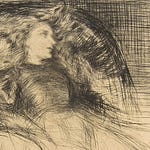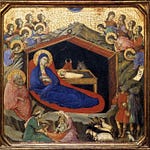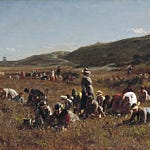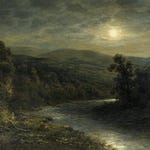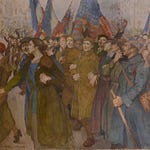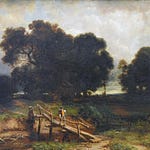When I was a boy, I used to wonder how they figured that Jesus rose from the dead on the third day, because I thought of days in the American way and not in the Hebrew way. For the children of Israel, the new day began at sunset: and that’s not a bad way of viewing things, because it means that each day ends not with darkness but with the soft light of the setting sun. It’s as if the experience of daytime was not a passage into the dark, but a passage out of the dark. So the sacred author of Genesis says, “And there was evening and there was morning, one day,” with the sentence ending on the resounding word, one — as in the great prayer, “Hear, O Israel, the Lord, the Lord thy God is one.” But see, the form of the day reflects the form of creation: there is nothing, and then, God says, “Let there be light.”
Jesus then died before the sun set on Friday, and he rose at the dawn on the day following the Sabbath, the eighth day, and there we have our Word of the Week. So there was the end of Friday, all of Saturday, and that part of Sunday from sunset on Saturday till dawn: the third day indeed. But it wasn’t the Sabbath. It was the day beyond the Sabbath, a crowning of that divinely commanded unit of time we call the week. It did not pass unmarked by the first Christian writers. Saint Peter notes that there were eight souls saved in Noah’s ark, and, thinking along those lines, the Christians of old often built octagonal churches, such as San Vitale in Ravenna, and I’ve seen many an octagonal baptismal font or baptistery, such as the one in front of Santa Maria del Fiore, in Florence. The eighth day, says Saint Augustine, is the seventh day raised to eternity: it has a morning, but no evening.
If we think about it a little, we see that after all the Old Law was not taken up with the number eight, but rather with the ordinal eighth. For the eighth day was the crowning of a week of seven days. So the Feast of Booths, commemorating with harvest joy the passage from Egypt and the Sinai desert into the Promised Land, was a week-long feast and more, which came to its crowning in the most solemn eighth day. So the baby boy was circumcised not on the seventh but on the eighth day, as if to mark a new birth, a new creation after the first seven days of his life. The feast of Pentecost and the great Jubilee also involve the eighth: they aren’t seven sevens, but the fiftieth, the eighth day or the eighth year of the final seven. So even the Sabbath points beyond the Sabbath, as rest is not the end but the preparation to rejoicing. What is beyond the holy peace of God? We may say it is the eighth day bonfire of God’s love: or they are one and the same, the Sabbath peace as seen from the point of view of God’s changeless being, and the fire of love as seen from the point of view of God’s ever-creative action.
Easter then cannot be a feast like any other. What can be more new than the new heaven and earth toward which it directs our eyes? What is more than life, and life in abundance? When Jesus raised Lazarus from his bed of death, it was a resuscitation, a revitalization, not the resurrection of the flesh. I imagine that when Mary and Martha saw their brother, they recognized him instantly. There was no reason not to. But the risen Christ appears in a room without anyone seeing how; he walks with the disciples on the road to Emmaus and they do not know him till the breaking of the bread in the wayside inn; Mary Magdalene supposes he is the gardener near the tomb, and suddenly recognizes him with a shock, crying out, “Rabboni!” — “My Teacher!” When we see him at last, says the Beloved Disciple, we will know him, because we will be like him, and we will see him as he is. That is not somebody talking about resuscitation. “Behold,” says the One seated on the throne, “I make all things new.”
Just a little here on the word: our eight comes from Old English eoht, with the h pronounced like the ch in Scots loch. It’s a cousin of Latin octo (from which we get Italian otto, Spanish ocho, Portuguese oito, and so on), Greek okto, Hindi aath, Welsh wyth, Armenian ut’, and on and on. We started to use the spelling gh in Middle English, to stand for that sound or the same sound voiced — a kind of gargling sound we don’t have anymore, but that sometimes turned to g or w. A quick way to tell if a language is a distant cousin of English is to look at the numbers two to ten. There might be an outlier or two here or there, but in general, if you see something like tri for three (Irish), you’ve got a cousin.
May the Lord who made this world in measure, weight, and number shower his blessings on you and your family, and may this Eastertide be for you an earnest of that morning star that never sets.
Mosaic of the Lamb of God, in the dome of San Vitale, with the four angels and the four Living Creatures, representing the four Evangelists







